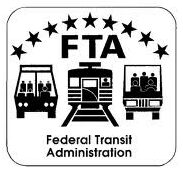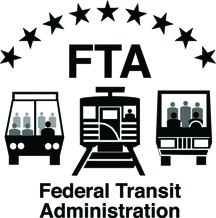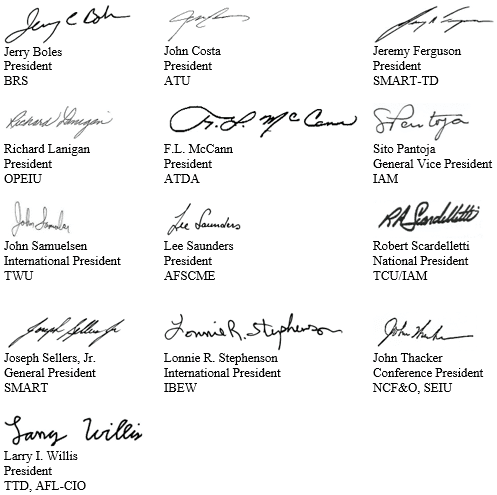The Transportation Trades Department of the AFL-CIO, of which the SMART Transportation Division division is a member, filed a response to the Federal Transit Administration’s request for information regarding transit worker assaults. Its filing is reproduced below.
On behalf of the Transportation Trades Department, AFL-CIO (TTD) and our 33 affiliated unions, we thank you for taking this important step to begin examining the serious safety issues facing transit workers across this country every single day.
TTD’s affiliated unions collectively represent most transit workers in this country, including rail transit, bus, roadway, construction, and maintenance workers. Most of these workers interface directly with the public, and all are exposed to the risks of assault. We have long-called for both legislative and regulatory solutions to increase worker safety, including putting a stop to the scourge of assaults on transit workers.
Background
In 2015 TTD and our affiliated unions successfully fought for the inclusion of assault prevention language in the Fixing America’s Surface Transportation (FAST) Act. This language required the Federal Transit Administration (FTA) to publish a Notice of Proposed Rulemaking (NPRM) that established safety standards, practices, or protocols for protecting transit operators from the risk of assault. Unfortunately, despite our calls for the FTA to expedite the NPRM soon after passage of the FAST Act, the Obama administration did not act on this issue, leaving us in the hands of the Trump administration for four years.
Correctly anticipating that the Trump administration was unlikely to take action on transit assault, despite statutory requirements to do so, our executive committee called on Congress to take further steps to solve this crisis in 2018, including passage of the Transit Worker and Pedestrian Protection Act. Critically, elements of the Transit Worker and Pedestrian Protection Act, in combination with the Public Transit Safety Improvement Act, both supported by transportation labor, were included first in the INVEST in America Act, and in the Infrastructure Investment and Jobs Act (IIJA), which was ultimately signed into law on November 15, 2021.
While this is a historic step for transit worker safety, it comes more than seven years after the FAST Act mandated real action to solve this crisis. Tragically, during these intervening years thousands more transit workers have been needlessly attacked – particularly because of COVID safety enforcement – and many more have been killed while performing their duties.
The token action taken by the FTA under the Trump administration fell far short of both what was required in statute and what was needed to help protect these workers. Rather than issuing a rule protecting transit operators from the risk of assault, as required by the FAST Act, the FTA — more than four years after the passage of the law — instead issued a toothless suggestion that transit agencies merely examine the problem if they felt so inclined. Specifically, the notice required local transit agencies to study the problem, but stopped short of requiring any meaningful action. A problem as widespread and important as worker assaults should not be left to a piecemeal approach where workers’ safety is left up to local jurisdictions without resources or meaningful guidance from FTA. Despite TTD’s calls to offer real mitigation strategies that may have included the increased use of driver shields or de-escalation training, the FTA willfully ignored the health and safety of hundreds of thousands of frontline workers.
As mentioned above, the IIJA includes key priorities from the Transit Worker and Pedestrian Protection Act and the Public Transportation Safety Improvement Act, which together, will significantly improve safety for transit workers. It is important to note that these safety improvements will only be realized if the provisions required by the IIJA are implanted in such a way that transit agencies are held accountable in the transparent reporting of safety data as well as in their partnership with frontline workers to develop safety plans.
While the applicability of these provisions to this RFI are discussed in greater detail below, specifically they will:
1. For recipients of 5307 assistance in urbanized areas with a population over 200,000, the recipient must:
a. Establish a safety committee that is made up of an equal number of frontline employee representatives and management representatives, which has responsibility for:
i. identifying and recommending risk-based mitigations or strategies necessary to reduce the likelihood and severity of consequences identified through the agency’s safety risk assessment;
ii. identifying mitigations or strategies that may be ineffective, inappropriate, or were not implemented as intended; and
iii. identifying safety deficiencies for purposes of continuous improvement.
iv. Not less than 0.75 percent of a recipient’s funds must go to safety-related projects eligible under section 5307.
2. For recipients of 5307 assistance in urbanized areas with a population fewer than 200,000, the agency safety plan must be developed in cooperation with frontline employee representatives. The above-described performance targets and set aside do not apply to those recipients.
3. Changes to National Transit Database (NTD) reporting: Transit agencies must now report all assaults on transit workers to the NTD, defined as: “a circumstance in which an individual knowingly, without lawful authority or permission, and with intent to endanger the safety of any individual, or with a reckless disregard for the safety of human life, interferes with, disables, or incapacitates a transit worker while the transit worker is performing the duties of the transit worker.”
TTD cannot overemphasize the need to expeditiously implement these new requirements as, particularly given the increase in assaults faced by transit workers as a result of COVID safety enforcement and in light of the historical circumstances that necessitated seven years of further advocacy to protect our workers, even after Congress recognized the need for additional protections and mandated FTA to uphold its responsibilities to transit workers.
What types of FTA actions might be beneficial to support roadway worker safety?
Roadway workers can be particularly vulnerable to injury due to the nature of their jobs, and we strongly believe that FTA has a duty to provide regulation to ensure that these workers are protected. Too many tragic incidents have occurred leading to serious injuries and deaths that could have been avoided with adequate protections in place. We support the comments of NTSB Chair Jennifer Homendy regarding the need to end the use of Train Approach Warning (TAW) and similar protocols. The safety of workers’ lives deserves many more redundancies than TAW can provide, as demonstrated by the many tragic incidents cited in NTSB’s letter.
One important redundancy that should be utilized is Positive Train Control systems (PTC), which provide crucial information to locomotives. We encourage the use and expansion of PTC and view it as an important safety tool. However, the PTC systems are only part of a solution that should include multiple redundancies and fail-safes. PTC systems can only notify operating engineers of messages sent by dispatchers or readings picked up on installed sensors. There are no sensors on locomotives or tracks that specifically check for the presence of workers. Additionally, dispatchers do not always have accurate reports of which tracks are occupied by roadway workers, and even small errors can have deadly consequences. Occasional human error is an unavoidable fact of life, and the only way to ensure safety is to have layered mechanisms designed to work even if other mechanisms fail.
Robust safety protocols are necessary to ensure that all redundancies are leveraged to keep roadway workers safe. These redundancies include ongoing communication with dispatchers, shunts, blue flags, signage, and locked derails to indicate that tracks are occupied. Labor representatives must have input in identifying needed redundancies and protocols. There is no excuse for failing to use simple, tried and tested methods such as flags, signage, and derails, even as we adopt new technologies.
What types of interactions typically lead to transit worker assaults, including operator assaults?
Historically, our ability to examine aggregate data about trends in assaults has been limited to information collected in the National Transit Database. Unfortunately, data collected into the NTD has long failed to accurately represent national trends in workplace violence. That is because the only data that is collected in the NTD are injuries which result in an arrest, serious injury, or death. Shockingly, based on the definition of serious injury in statute, it is our understanding that a transit operator could have their nose broken, be hospitalized for 24 hours, and suffer first-degree burns without triggering any reporting requirements.
Furthermore, the limited information that is collected is exceedingly difficult to view and examine. A request for recent assault data from the NTD made by the Transportation Trades Department in 2018 was rejected, and we were told that we should instead submit a FOIA request.
We are therefore left to rely primarily on news stories or information reported by union locals representing workers at transit agencies to better understand both the circumstances that lead to assault as well as the nature of the assaults themselves. To that end, we are hesitant to speculate on “typical” interactions that lead to worker assaults. The enforcement of mask and other COVD safety mandates and farebox collection are undoubtedly a significant factor in many of these interactions. However, the seemingly arbitrary nature of many incidents reviewed by TTD and our affiliated unions necessitates the collection and analysis of accurate data.
Importantly, the Infrastructure Investment and Jobs Act redefines assault for the purpose of data collection in the NTD. Per Division C, Section 30001 of the IIJA, assault on a transit worker is now defined as:
“Assault on a transit worker — The term ‘assault on a transit worker’ means a circumstance in which an individual knowingly, without lawful authority or permission, and with intent to endanger the safety of any individual, or with a reckless disregard for the safety of human life, interferes with, disables, or incapacitates a transit worker while the transit worker is performing the duties of the transit worker.”
While this is a critical step in better understanding the national trends in workplace safety for transit workers, it is equally critical that this data be transparent and easily accessible not just to the safety committees created under the IIJA but to researchers, labor unions, and other individuals who may use that information in the pursuit of improving safety for working people.
What actions could address and limit these types of interactions?
First, TTD strongly supports the creation of joint labor-management safety committees as required under the IIJA to solve this problem and encourages expeditious implementation of this portion of the IIJA by the FTA. This approach is not a one-size-fits all solution but instead recognizes that local problems require local solutions.
What approaches could prevent transit worker assaults?
Again, we support the process for arriving at solutions as laid forth in the IIJA. Transit workers should work directly with management to examine data, under the new reporting requirements of the IIJA, and determine local solutions best suited to meet their needs. That may include a full redesign of the operator workstation, driver shields, de-escalation training, changes to routes or route intervals, the presence of law enforcement, along with other interventions or combinations of certain interventions.
What differences, if any, are there in approaches to preventing transit worker assaults across different types of transit systems or modes?
Currently, the response is piecemeal. Some transit agencies have responded to safety threats by including shields for drivers. However, there is no consistency across agencies in the implementation or design of shields. Passengers have still been able to reach around and throw objects at workers or make contact with them. While we reiterate our support eschewing a one-size-fits all solution, we strongly urge the FTA to provide transit agencies with best practices when implementing solutions. Minimum standards for shield designs or workstation redesign, for example, may help to avoid solutions that are well intentioned but ultimately ineffective.
If FTA pursues requirements to address transit worker assaults, what minimum requirements should be included?
It is critical to note that this RFI was issued on 9/24/21, prior to the passage of the IIJA. TTD firmly supports the implementation of transit worker safety improvement required under that act. Moreover, we believe that NTD data on transit assaults must be available and transparent, and that the FTA should partner with transit agencies to ensure consistency in the implementation of interventions across the nation.
Further, TTD strongly supports additional actions, like the Competitive Research Funding Opportunity: Redesign of Transit Bus Operator Compartment to Improve Safety, Operational Efficiency, and Passenger Accessibility NOFO issued by the FTA on 02/11/2020. Ultimately, retrofits like shields are helpful but are often imperfect. A wholesale reimagining of the operator’s workstation including the inclusion of worker safety standards for procurements are necessary to ensure the wellbeing of operators, both from assaults and ergonomically, as well as for the reduction of blind spots and the safety of those sharing the road with transit vehicles.
We would also like to note that the FTA does not have a choice in implementing strategies to prevent worker assaults, as this question implies. The FAST Act mandated such action from the agency, and we are glad to see the agency stepping up to meet its statutory obligations.
How should the requirements apply to different transit system types or modes?
This question recognizes a unique challenge. Rail station managers, rail workers, bus operators, maintenance yard workers, and all other transit employees face unique circumstances and safety challenges that require solutions tailored to their environment.
We believe this challenge is largely addressed by the IIJA, through the creation of safety committees made up of workers and management, who, together can identify their unique challenges and the solutions necessary to solve them.
The FTA must be an active partner in this process, and these committees must not be a box-checking exercise for transit agencies, however. Providing true oversite, making newly collected data in the NTD transparent and accessible to researchers and representatives of labor, and holding listening sessions at a national level to provide oversight of this program as its implemented will all be critical in the coming three years.
What other types of FTA actions might be beneficial to support transit worker assault prevention?
In its role as the federal authority on transit and transit safety, FTA should be continually engaged to identify actions that would benefit the safety of everyone who uses our nation’s transit systems. If transit workers are unsafe, they are not able to do their jobs and ensure a safe and comfortable experience for riders. Because of the complexity of transit systems, increased coordination will be needed to ensure that transit worker assaults do not continue to skyrocket. Data-sharing, transparency, and collaboration with frontline workers and labor groups should be prioritized as new ideas are considered.
What information is collected on transit worker assaults that is not reportable to the NTD?
Prior to the passage of the IIJA, the NTD only collected data on assaults leading to “serious injury” as then defined in 49 CFR 830.2, “(1) Requires hospitalization for more than 48 hours, commencing within 7 days from the date of the injury was received; (2) results in a fracture of any bone (except simple fractures of fingers, toes, or nose); (3) causes severe hemorrhages, nerve, muscle, or tendon damage; (4) involves any internal organ; or (5) involves second- or third-degree burns, or any burns affecting more than 5 percent of the body surface.” Obviously, this definition leaves out many possible injuries that need to be captured to have an accurate understanding of transit worker assaults. We believe that the passage of the IIJA will be a major improvement to this issue; however, the FTA must also renew its commitment to transparency and ensure that such data is made available for review.
What internal threshold do RTAs use for tracking transit worker assaults other than those reportable to the NTD?
It is impossible to know what threshold every RTA uses across the country, and we believe that this demonstrates a piecemeal and haphazard approach to transit worker safety. With the passage of the IIJA, we hope that reporting of assaults will be brought into harmony across jurisdictions and allow for more robust leadership from FTA to ensure that our nation’s transit workers are adequately protected. The definition of assault and the data that is collected regarding it should not vary across RTAs. Further, this kind of tracking should not be limited to only those RTAs that have Public Transportation Agency Safety Plans, as this can exclude rural transit agencies.
On average, how many additional transit worker assaults occur per year that do not meet a current NTD reporting requirement?
While the answer to this question would undoubtedly be useful in addressing the scourge of transit worker assaults, the lack of an adequate answer is part of the problem. Transit agencies are not often forthcoming with information, which not only means that responsibility is neglected and left to representatives of the frontline workers to try their best to collect that data, but also that transit agencies have no way of responding to national trends because of a significant lack of awareness.
What are or would be the costs associated with tracking these additional assaults?
TTD believes that any additional costs associated with collecting and reporting this data are trivial relative to the incurred costs of workers compensation, lost hours from workers, and the high turnover at transit agencies as a result of deteriorating workplace conditions. Whatever trivial costs may exist should not be a criterion in determining how or whether or not they should live up to their statutory requirements under the IIJA to do so. Moreover, we believe they should go beyond the basic requirements of the IIJA and report this information annually, with analysis, and tools for transit agencies to implement interventions that may alleviate the impacts of national trends in assault.
What technology is available to address transit worker assaults, including operator assaults?
TTD supports the research and implementation of technologies that improve worker safety. In the case of worker assaults, however, there are a number of solutions that could be implemented easily and without the need for additional research and testing time that would be needed for new technologies. Simple workstation redesigns that provide secure barriers between workers and the public would deter many assaults. De-escalation training, route planning, and procedural and schedule planning can mitigate many assaults. We do not believe that FTA should wait for possible technologies to be developed to implement these known solutions.
How can FTA better support the development and implementation of these technologies?
For the reason noted above, FTA needs to be actively involved in the implementation of new technologies and strategies to increase transit worker safety. As part of these efforts, the agency should consult directly with frontline workers and representatives of frontline workers, including safety experts and law enforcement professionals, to share lessons learned in the field, and specific thoughts on how to correctly implement the statutory requirements of the IIJA.
In closing, TTD urges FTA to act expeditiously in the implementation of new transit safety requirements in the IIJA, and reminds the agency of its statutory obligations to protect transit workers from assault. We appreciate the opportunity to comment and look forward to working with the agency moving forward.

 U.S. DOT’s Federal Transit Administration (FTA) has announced that registration is open for National Transit Institute (NTI) and Transportation Safety Institute (TSI) safety training courses for transit personnel.
U.S. DOT’s Federal Transit Administration (FTA) has announced that registration is open for National Transit Institute (NTI) and Transportation Safety Institute (TSI) safety training courses for transit personnel.
 The Federal Transit Administration (FTA) posted its
The Federal Transit Administration (FTA) posted its 